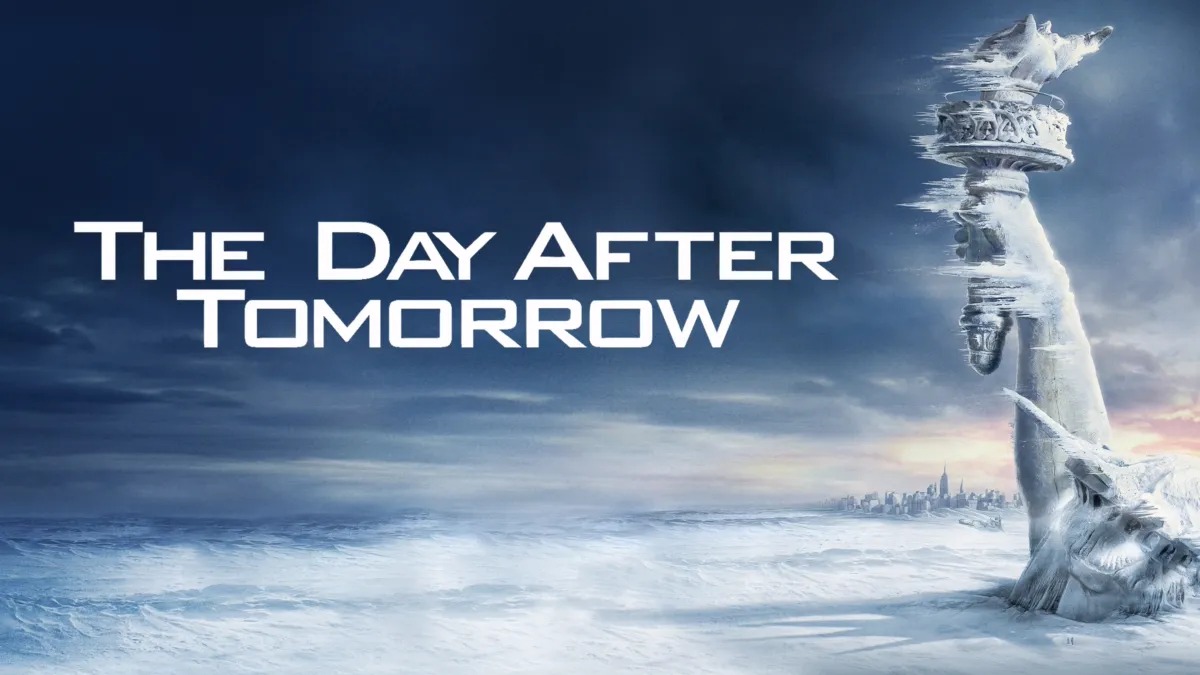The Day After Tomorrow

“The Day After Tomorrow,” directed, co-written, and co-produced by Roland Emmerich, is a 2004 American science fiction disaster film that presents a dramatic and high-stakes portrayal of climate change and its potentially catastrophic effects on the world. Based on the 1999 book “The Coming Global Superstorm” by Art Bell and Whitley Strieber, the film features a prominent cast including Dennis Quaid, Jake Gyllenhaal, Emmy Rossum, and Ian Holm. With its combination of thrilling disaster sequences and environmental themes, “The Day After Tomorrow” offers both entertainment and a cautionary tale about the dangers of global warming.
The film opens with a series of scientific observations made by paleoclimatologist Jack Hall (Dennis Quaid), who predicts a series of extreme weather events caused by global climate change. Despite his warnings, a sudden and unprecedented series of natural disasters begins to unfold. The story follows the dramatic effects of these disasters, which include massive storms, flooding, and a new ice age that threatens to devastate the planet.
The central theme of “The Day After Tomorrow” is the impact of climate change on global weather patterns. The film illustrates how rapid and unchecked environmental changes can lead to catastrophic outcomes, including extreme weather events and large-scale environmental destruction. This theme is underscored by the film’s depiction of both the human and environmental costs of climate change, highlighting the urgent need for global action to address the issue.
Another significant theme is human resilience and the struggle for survival in the face of overwhelming odds. As the world grapples with the effects of the disaster, characters are faced with personal and collective challenges. Their efforts to survive and protect one another serve as a testament to human determination and solidarity in times of crisis.
Dennis Quaid delivers a strong performance as Jack Hall, the scientist whose research becomes crucial in understanding and addressing the unfolding disaster. Quaid’s portrayal captures the character’s dedication and expertise, as well as his personal stakes in the crisis, as he struggles to rescue his son amidst the chaos.
Jake Gyllenhaal plays Sam Hall, Jack’s son, who becomes a central figure in the story as he and his friends are stranded in New York City amidst the escalating disaster. Gyllenhaal’s performance adds emotional depth to the film, as Sam’s experiences highlight the human element of the disaster and the personal sacrifices made in the face of global calamity.
Emmy Rossum, who plays Laura Chapman, Sam’s love interest, provides a compelling performance that complements Gyllenhaal’s role. Rossum’s portrayal adds a layer of emotional complexity to the film, as her character’s struggle to survive and maintain hope amidst the disaster reflects the broader themes of resilience and human connection.
Ian Holm, as Professor Terry Rapson, a colleague of Jack Hall, delivers a strong supporting performance. Holm’s role adds a scientific and intellectual dimension to the narrative, emphasizing the global scope of the crisis and the collaborative efforts required to address it.
Roland Emmerich’s direction in “The Day After Tomorrow” is marked by its grand scale and dramatic visual effects. Emmerich, known for his work in the disaster genre, creates a film that is both visually stunning and emotionally engaging. His direction ensures that the film’s action sequences are intense and immersive, while also providing moments of character-driven drama that add depth to the story.
The screenplay, co-written by Emmerich, Jeffrey Nachmanoff, and Art Bell, is characterized by its blend of scientific speculation and dramatic storytelling. The script effectively balances the film’s disaster sequences with personal and emotional narratives, creating a well-rounded and engaging experience. While the scientific accuracy of the film’s portrayal of climate change has been debated, the screenplay’s focus on human resilience and global cooperation resonates with audiences.

The visual style of “The Day After Tomorrow” is a key element in its storytelling. The film’s special effects, created by a team of visual effects artists, depict the dramatic and catastrophic weather events with striking realism. The use of CGI and practical effects creates a sense of urgency and scale, immersing the audience in the film’s depiction of environmental disaster.
The tone of the film is a mixture of suspense, drama, and hope. The film’s pacing is fast, with intense sequences of natural disasters interspersed with moments of personal drama and emotional depth. The score, composed by Harald Kloser and Thomas Wanker, complements the film’s tone, adding to the sense of urgency and emotional impact.

“The Day After Tomorrow” received mixed reviews from critics, with praise directed at its visual effects and action sequences, but criticism aimed at its scientific accuracy and plot development. Despite this, the film was a commercial success, drawing significant audiences and generating discussions about climate change and environmental issues.
The film’s impact extends beyond its entertainment value, contributing to public awareness of climate change and environmental concerns. While its scientific portrayal may be dramatized, “The Day After Tomorrow” serves as a reminder of the potential consequences of environmental neglect and the importance of addressing climate issues.

In summary, “The Day After Tomorrow” is a dramatic and visually impressive film that combines elements of science fiction and disaster cinema to explore the potential impacts of climate change. Directed by Roland Emmerich and featuring strong performances from Dennis Quaid, Jake Gyllenhaal, and the supporting cast, the film offers both thrilling entertainment and a cautionary tale about the dangers of environmental degradation. Through its depiction of catastrophic weather events and human resilience, “The Day After Tomorrow” contributes to the ongoing dialogue about climate change and the need for global action to protect the planet.











